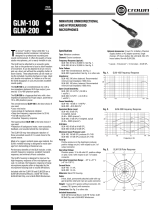
7
Then, follow the instructions on the Woofer Cal page to pair
W371A with a monitor, choose the W371A Mode you wish to
use, select the crossover frequency range (or use the default)
and finally double-click the microphone icon. This launches the
calibration process for W371A. Frequency sweeps are audible
on the W371A, one woofer at a time, followed by the main
monitor sweep. After this, the calculation process starts. The
progress of the calculation is shown on the GLM page.
This section is only needed when you wish to manually edit
the monitor loudspeaker acoustic calibrations before calibrating
the W371A woofers to work with the loudspeakers. Normally,
this process is not necessary.
Evaluating Modes
To evaluate different W371A directive mode options, go to the
Group tab and select Duplicate Group. Then, in the duplicated
Group, double-click the microphone icon to re-run AutoCal.
Press Skip AutoCal. After this, on the Woofer Cal page, double-
click on the microphone icon to re-run the W371A calibration
selecting your desired directivity options.
For example, you may wish to have four Groups for testing:
monitor alone, monitor + W371A in the Complementary Mode,
monitor + W371A in the Directive Mode, monitor + W371A in
one of the Null Steering Modes. When auditioning, notice that
it can take a relatively long time (up to a week) before all the
qualities of each mode may be fully appreciated.
Frequency Response Trim
The calibration procedure provides state-of-the-art flat frequency
response suited for critical reference listening. Depending
on the application and your previous listening experience, a
slightly downwards tilted system frequency response may be
considered relevant by certain users. The frequency response
of each monitor Group may easily be tilted using the Sound
Character Profiler found under the Group menuin GLM. When
the monitoring loudspeakers are used without having a computer
connected, select the Store settings after trimming to make the
trimming permanent. Re-storing the setup file in a computer
saves your trimming for the situation where a computer running
GLM is used in daily work.
Selecting Crossover Regions
W371A calibration enables selecting the crossover frequency
ranges. Your selections of the ranges are affected by room
acoustics, W371A and listening locations. You may want to
avoid notches in the monitor response. The default crossover
range is 150-250 Hz. You can select a higher range up to 300
Hz and no narrower than 50 Hz wide. The measurement curves
and subjective evaluations may guide your preferences as well
as your choice of the W371A operating mode. When the W371A
is positioned behind a large console obscuring the upper front
woofer, a low crossover range below 250 Hz is advisable.
Operating Environment
This product is designed for indoor use only. The permissible
ambient temperature is 15-35 degrees Celsius (50-95°F) and
relative humidity 20% to 80% (non-condensing). To prevent
condensation of humidity, after the product has been stored
or transported in a cool environment and is then taken into a
warm room, wait 0.5-1 hours before opening the packaging and
connecting to the mains power.
Sufficient cooling around the W371A must be ensured. The
minimum clearance behind and on both sides of the monitor is 10
cm (4 in). The product is not designed to be installed in a recess.
Front Panel Light
Normally, the light on the front panel is green, indicating normal
operational mode. Red and yellow colours are used to indicate
special situations. See Table 1.
Maintenance
There are no user serviceable parts inside the monitor.
Maintenance or repair must only be done by Genelec certified
service personnel. The monitor enclosure must not be opened.
Opening the monitor may lead to loss of the individual monitor
factory calibration and damage to components.
Safety Considerations
Although the W371A has been designed in accordance with
international safety standards, to ensure safe operation and
to maintain the monitor under safe operating conditions, the
following warnings and precautions must be observed:
• Servicing and adjustment must only be performed by
certified Genelec service personnel. The monitor enclosure
must not be opened.
• Do not use this product with an unearthed mains cable
or a mains connection without the protective earth contact
as this may lead to personal injury.
• To prevent fire or electric shock, do not expose the unit
to water or moisture.
• Do not place any objects filled with liquid, such as vases
on the monitor or near it.
• Note that the amplifier is not completely disconnected
from the AC mains service unless the mains power cord is
removed from the monitor loudspeaker or the mains outlet.
• Free flow of air behind and around the monitor is
necessary to maintain sufficient cooling. Do not obstruct
airflow around the monitor.
WARNING!
The W371A is capable of producing sound pressure levels in
excess of 85 dB, which may cause hearing damage. Sound
exposure level integrated over an 8 hour working day should
be limited to 80 dB(A) to reduce the risk of permanent hearing
damage. For each 3 dB increase in the sound exposure the
acoustic energy is doubled, and the exposure time should be
halved to maintain the same risk level.
Guarantee
The Genelec W371A is guaranteed for two years against
manufacturing faults or defects altering performance. In
addition to this, you can get additional three years of guarantee
that covers spare part costs by registering your product at www.
genelec.com. Refer to the reseller for full sales and guarantee
terms.
Compliance to FCC Rules
Note: This equipment has been tested and found to comply
with the limits for a Class B digital device, pursuant to part
15 of the FCC Rules. These limits are designed to provide
reasonable protection against harmful interference in a
residential installation. This equipment generates, uses and
can radiate radio frequency energy and, if not installed and
used in accordance with the instructions, may cause harmful
interference to radio communications. However, there is
no guarantee that interference will not occur in a particular
installation. If this equipment does cause harmful interference













